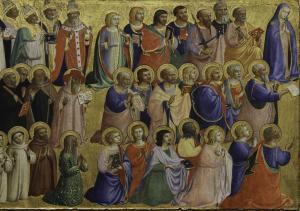
God doesn’t want us to be mere servants; we should not think God as being some unreasonable master who makes unreasonable demands of us. What God wants is to be friends with us. In that friendship, we should unite ourselves to God and the divine will, for friends have a special bond which often leads them to seem to be so united, it is as if there were one will between them. To make this clear, before his death, Jesus told his apostles, and through them, the rest of his followers, that they should not consider themselves to be his servants, but his friends: “No longer do I call you servants, for the servant does not know what his master is doing; but I have called you friends, for all that I have heard from my Father I have made known to you” (Jn. 15:15 RSV). To be God’s friends, we must do the will of God, that is, we must fulfill God’s commandments (cf. John. 14:15), not because we are afraid of God and merely do as we are told out of fear, but because we become so united with Jesus (and therefore, God) that we find ourselves willing what God wills. As our friendship with God grows, we will find our unity with God changes us, gives us all kinds of grace, so we become like God, the God who is love. We will become reflections of God’s love, desiring to make friends with everyone the same way Jesus did what he could to become our friends.
J.R.R. Tolkien helps us understand the kind of friendship God wants to have with us, the friendship of a loving parent, by telling us how all parents want to help their children grow and mature so that their children can become their friends: “Every good father deserves the fraternal friendship of his sons when they grow up.”[1] In the incarnation, God entered into creation in order to lift it up, to help it grow in grace and maturity, so that all the subjects which exist in creation can go from looking up to God merely as a master to appease to seeing God as a loving parent who wants a relationship with them, to become their friends. Everyone is called to be a friend of God, that is, a saint, but again, this is possible because of the incarnation, for in and through it, God has established the way in which created subjects can have a kind of equality with their creator:
Also, because friendship exists between equals, as long as you consider God to have made Himself equal to man in some way, you should not deny the friendship God has with you, nor should you forsake your friendship with God. So let men cease, I repeat, let them cease despairing of their divinity at once! [2]
How can we, when we are not equal to God by nature, become friends with God, treated as equals? We are shown the answer with the incarnation, where we find God does not hold onto the divine nature as a way to keep distant from us, but is willing to engage self-emptying love to make room for us so we can participate in the divine life ourselves. God the Word assumed a created nature, a human nature, unto itself, so that the divine reality can have a personal unity with creation (without annihilating the distinctions between the two). Jesus’ human nature has made God the Word our equal, for now Jesus shares with us our nature, becoming consubstantial with us.
We must take the love and grace which has been given to us, embrace it, engage it, allow it to develop in us, so that with it we can grow in spiritual maturity, becoming the persons God wants us to be, and when we are, we will find ourselves having truly become friends of God. We are all called to be saints, to be lovers of God. But again, to be a friend of God, we must participate in the divine life, sharing in the divine life, and therefore, sharing the divine will and what it wants. We are to love God, but also, we are to love like God, desiring all to be saved, all to be made saints, that is, desiring everyone to share in and participate in the divine life with us.
The kingdom of God, heaven, our eschatological glory will reflect the way we have become friends with others, including, and especially, those who were once our enemies, even as God has become our friends despite the way we could be said to have been God’s enemies when we embraced sin and the unlove which lies behind it:
Heaven will be that inter-mutuality in loving giving and sharing with those who have freely surrendered to Christ. Heaven should begin now as we live the beautiful teaching of the Church on the Communion of Saints. Then death will never separate us from our beautiful brothers and sisters, our relatives and friends, but it will be the occasion to move into the real world and begin to experience the fulfillment of the prayer of Jesus that He is continuously offering to His Heavenly Father on behalf of all God’s children: […][3].
We shall be called children of God. But, we can and should experience our status us children of God, not just in eternity, but in our temporal existence. We can participate and experience the eschaton in time, for, the eschaton is immanent thanks to the incarnation; we are to experience it in the eschatological “already but not yet,” whereby, the more we embrace God’s love and let it transform us, the more we will find ourselves participating in and experiencing the eschaton, while the aspect of it which we have not yet experienced and participated in is found in the way we have yet to fully embrace the way of love and rebel against it with our sinful habits. We must open ourselves to God, let God’s love transform us, let us represent the eschatological kingdom of God more and more, not just in our words, but in our deeds. We must truly unite ourselves to God and God’s will, so that what we say and do serves that will and God’s desire to transform all creation into the kingdom of God: “All the good works which a man has performed will be in vain if he does not possess a genuine charity which he extends to his enemies as well as to his friends.” [4] This love should have us desire to become one with the rest of creation, and in that unity, find ourselves becoming friends with everyone found in it, even as God seeks to be our friends. This is what it means to follow the rule or way of love:
The rule of love is that one should wish his friend to have all the good things he wants to have himself, and should not wish the evils to befall his friend which he wishes to avoid himself. How shows this benevolence to all men. No evil must be done to any. Love of one’s neighbor workerth no evil (Rom. 13:10). Let us then love even our enemies as we are commanded, if we wish to be truly unconquered. [5]
To act with such love with everyone, including those who can be said to be our enemies, does not mean we must deny justice and just ignore the harm people do to each other. Rather, it should serve as the means by which we engage justice, making sure we recognize the dignity of everyone, even those who have done something which must be stopped. How we deal with their actions must be moderated with love, which means, we will treat them with mercy, but also, considering the people they have harmed, making sure they are also treated with love and mercy and the harm they suffered is healed. Seeking an end to some sort of injustice must not lead us becoming unjust, which is why we must not seek retribution (or revenge), but rather restorative justice, restoring that which sin harm or destroyed, including, and especially, the unity in love everyone in creation should have with each other. In such unity, we will we will be sharing the friendship God has with us with everyone else, realizing that our participation and experience of the divine life is communal:
Yet the filial devotion that comes from this love cannot be perfected without love of neighbor. By the term “neighbor” are to be understood not only those who are joined to us by friendship or kinship, but all people with whom we have a common nature, be they enemies or allies, free or slave. One Creator fashioned us all, one Maker breather life into us all. We all enjoy the same sky and air, the same days and nights. Although some are good and others bad, some just and others unjust, God nevertheless shows generosity to all, kindness toward all – as the apostles Paul and Barnabas said to the Lycaonians concerning the providence of God: “During generations past he gave leave for all nations to embark upon their own ways. Yet he did not allow himself to be left without witness, doing good to them, giving rain and fruitful seasons from heaven, filling our hearts with food and with delight.” [6]
Let us engage God; let us embrace the way of love, and find ourselves becoming the friends of God, following the example of those friends, those saints, who came before us. They still embrace us, share with us their love, the grace which they have been given, which is why we can and do look to them for help. We are called to join them in their heavenly celebration, in the eschatological banquet which knows no end. Those who have grown in grace and have been perfected by it, the saints who have come before us, have become free, free to be like God, to act like God, to share with others that which they have been given, and they do so, not just once, not just temporally, but eternally, just as God is doing so in all eternity. Why should we expect any less?
[1] J.R.R. Tolkien, The Letters of J.R.R. Tolkien. Revised and Expanded Edition. Ed. Humphrey Carpenter and Christopher Tolkien (Broadway, NY: William Morrow, 2023), 61 [Letter 38a. to Michael Tolkien].
[2] Marsilio Ficino, On the Christian Religion. Trans. Dan Attrell, Brett Bartlett, and David Porreca (Toronto: University of Toronto Press, 2022), 97.
[3] George Maloney, SJ, Death Where Is Your Sting? (New York: Alba House, 1984), 62 [Prayer is Jn 17:21-24].
[4] St. Caesarius of Arles, Sermons Volume I (1-80). Trans. Mary Magdeleine Mueller, OSF (New York: Fathers of the Church, 1956), 196 [Sermon 39].
[5] St. Augustine, “Of True Religion,” in Augustine: Earlier Writings. trans. John H.S. Burleigh (Philadelphia: The Westminster Press, 1953),270.
[6] St Leo the Great, Sermons. Trans. Jane Patricia Freeland CSJB and Agnes Josephine Conway SSJ (Washington, DC: CUA Press, 1996), 51 [Sermon 12].
Stay in touch! Like A Little Bit of Nothing on Facebook.
If you liked what you read, please consider sharing it with your friends and family!
N.B.: While I read comments to moderate them, I rarely respond to them. If I don’t respond to your comment directly, don’t assume I am unthankful for it. I appreciate it. But I want readers to feel free to ask questions, and hopefully, dialogue with each other. I have shared what I wanted to say, though some responses will get a brief reply by me, or, if I find it interesting and something I can engage fully, as the foundation for another post. I have had many posts inspired or improved upon thanks to my readers.












